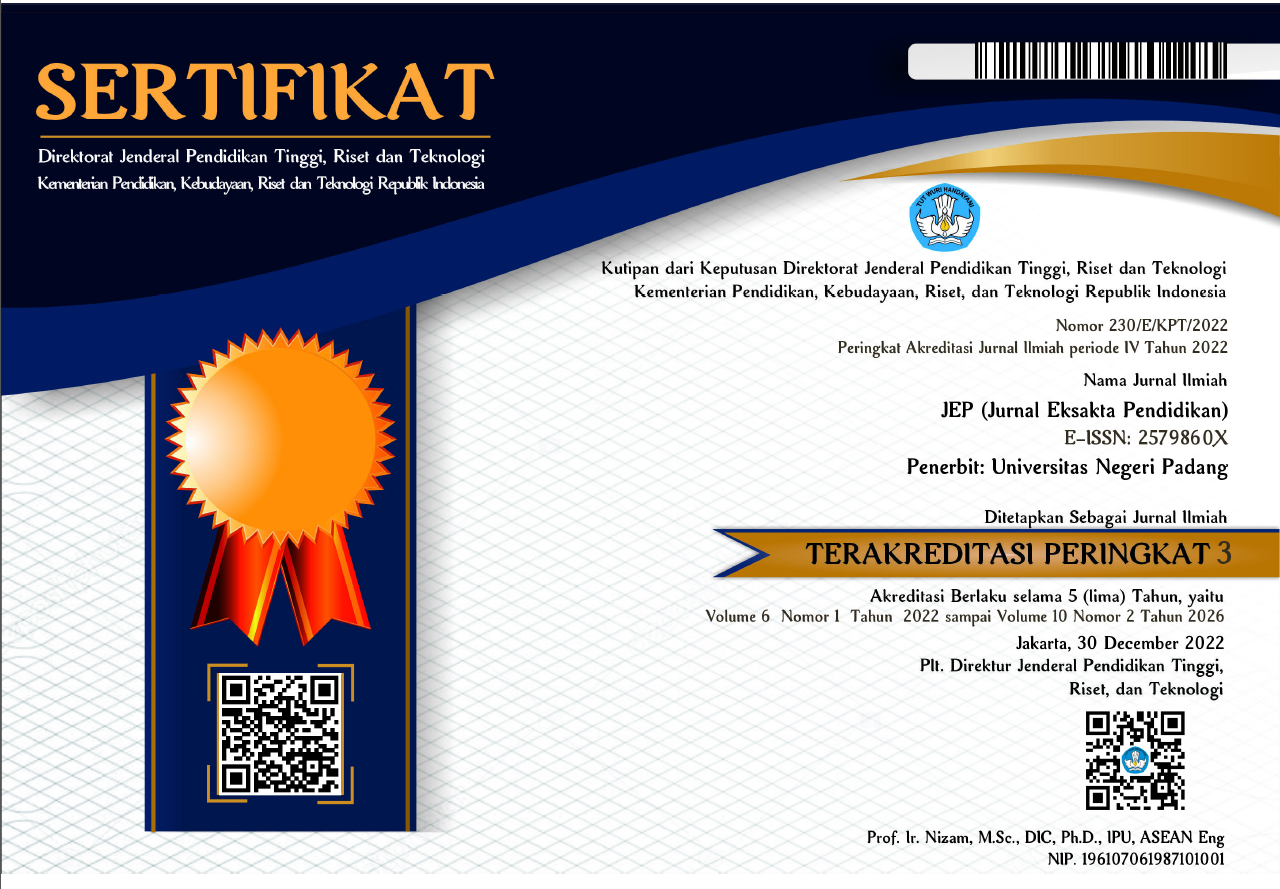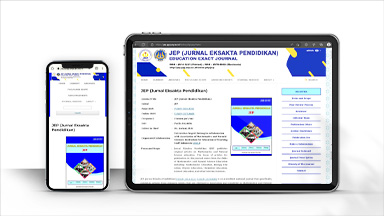Application of Problem-Based Learning to Improve Problem Solving Skills and Creative Thinking Skills of Class XI Students
Abstract
The learning paradigm shift emphasizes the integration of 21st century skills into learning activities. SMAN 4 Malang as a driving school in Malang City has implemented Independent Curriculum in producing students who have the competence and character of the Pancasila Student Profile. The Pancasila Student Profile has relevance to the skills needed in the 21st century. Problem solving skills and creative thinking skills as dimensions of the Pancasila Student Profile are classified into the main abilities that students need to have to face the challenges of the 21st century. However, based on observations of problem-solving skills and creative thinking skills of students in class XI MIPA 3 are still low. Efforts can be made by implementing Problem-based Learning. This study aims to improve problem solving skills and creative thinking skills of XI grade students in Biology learning using Problem-Based Learning. This type of research is a Classroom Action Research which was conducted in two cycles. Each cycle includes planning, implementation, observation, and reflection stages. The research subjects were students of class XI MIPA 3 totaling 31 students. The research data in the form of qualitative data were reduced, grouped, and narrated. Quantitative data were analyzed descriptively inferentially using paired sample t test. The results showed a difference in the average problem-solving skills and creative thinking skills before and after PBL was applied, so this study proves that the application of PBL can improve students' problem-solving skills and creative thinking skills in Biology learning.
Downloads
References
Afwah, L. N., Ratih Hendrastuti, Z., & Franita, Y. (2023). Pengaruh Model Pembelajaran Problem Based Learning berbantuan Flashcard Terhadap Kemampuan Pemecahan Masalah Matematis. Lebesgue: Jurnal Ilmiah Pendidikan Matematika, Matematika dan Statistika, 4(1).
Akben, N. (2020). Effects of the Problem-Posing Approach on Students’ Problem-Solving Skills and Metacognitive Awareness in Science Education. Research in Science Education, 50(3), 1143–1165.
Andrews-Todd, J., & Forsyth, C. M. (2020). Exploring Social and Cognitive Dimensions of Collaborative Problem Solving in An Open Online Simulation-Based Task. Computers in Human Behavior, 104.
Arends, R. I. (2012). Learning to teach 9. ed. Avenue of the Americas. NY: Me Grew Hill.
Asrori, & Rusman. (2020). Classroom Action Research. https://repository.um-surabaya.ac.id/4459/1/Classroom_Action_Research_Pengembangan_Kompetensi_Guru_.pdf
Bahri, A., Putriana, D., & Idris, I. S. (2018). Peran PBL dalam Meningkatkan Keterampilan The Role of PBL in Improving Biological Problem Solving Skill. Jurnal Sainsmat, 7(2), 114–124.
Baker, W. E., & Sinkula, J. M. (2005). Market Orientation And The New Product Paradox. Journal of Product Innovation Management, 22(6), 483–502.
Barbot, B., Besancon, M., & Lubart, T. I. (2011). Assessing creativity in the classroom. The Open Education Journal, 4(1), 58–66.
Bariyyah, K. (2021). Problem Solving Skills: Esssential Skills Challenges for the 21st Century Graduates. Jurnal EDUCATIO: Jurnal Pendidikan Indonesia, 7(1), 71.
Barrett, T., & Moore, S. (2010). New Approaches to Problem-based Learning. Routledge.
Boholano, H. (2017). Smart Social Networking: 21st Century Teaching and Learning Skills. Research in Pedagogy, 7(2), 21–29.
Bulut, B. (2019). The Impact of Peer Instruction on Academic Achievements and Creative Thinking Skills of College Students. International Journal of Educational Methodology, 5(3), 503–512.
Chang, S.-Y., & Tung, C.-A. (2009). Developing Critical Thinking through Literature Reading Incorporating MOOC Teaching Material into Regular Classes View project Developing Critical Thinking through Literature Reading. In Feng Chia Journal of Humanities and Social Sciences (Issue 19).
Chen, S.-Y., Tsai, J.-C., Liu, S.-Y., & Chang, C.-Y. (2021). The Effect of A Scientific Board Game on Improving Creative Problem Solving Skills. Thinking Skills and Creativity, 41, 100921.
Cheng, S. C., She, H. C., & Huang, L. Y. (2018). The Impact of Problem Solving Instruction on Middle School Students’ Physical Science Learning: Interplays of Knowledge, Reasoning, And Problem Solving. Eurasia Journal of Mathematics, Science and Technology Education, 14(3), 731–743.
Chiappe, A., & Rodríguez, L. P. (2017). Learning Analytics In 21st Century Education: A Review. In Ensaio (Vol. 25, Issue 97, pp. 971–991). Fundacao Cesgranrio.
de Leon-Abao, E., B. Boholano, H., & T. Dayagbil, F. (2015). Engagement to Social Networking: Challenges and Opportunities to Educators. European Scientific Journal, 11(16), 1857–7881.
Ernawati. (2017). Penerapan Model Problem Based Learning untuk Meningkatkan Kemampuan Pemecahan Masalah Materi Perbandingan dan Skala. Jurnal Pendidikan Guru Sekolah Dasar, 2(4), 110–120.
Greenstein, L. M. (2012). Assessing 21st Century Skills: A Guide to Evaluating Mastery and Authentic Learning.
Guo, P., Saab, N., Wu, L., & Admiraal, W. (2021). The Community of Inquiry Perspective on Students’ Social Presence, Cognitive Presence, and Academic Performance in Online Project-Based Learning. Journal of Computer Assisted Learning, 37(5), 1479–1493.
Habibi, Mundilarto, Jumadi, J., Gummah, S., Ahzan, S., & Prasetya, D. S. B. (2020). Project Brief Effects on Creative Thinking Skills among Low-Ability Pre-Service Physics Teachers. International Journal of Evaluation and Research in Education, 9(2), 415–420.
Harris, J. B., & Hofer, M. J. (2011). Technological Pedagogical Content Knowledge (TPACK) in Action: A Descriptive Study of Secondary Teachers’ Curriculum-Based, Technology-Related Instructional Planning. Journal of Research on Technology in Education, 43(3), 211–229.
Hestiana, & Rosana, D. (2020). The Effect of Problem Based Learning Based Sosio-Scientific Issues on Scientific Literacy and Problem Solving Skills of Junior High School Students. In Journal of Science Education Research Journal (Vol. 2020, Issue 1). www.journal.uny.ac.id/jser
Hobri, Ummah, I. K., Yuliati, N., & Dafik. (2020a). The Effect of Jumping Task Based on Creative Problem Solving on Students’ Problem Solving Ability. International Journal of Instruction, 13(1), 387–406.
Hobri, Ummah, I. K., Yuliati, N., & Dafik. (2020b). The Effect of Jumping Task Based on Creative Problem Solving on Students’ Problem Solving Ability. International Journal of Instruction, 13(1), 387–406.
Ilmi, N., Salempa, P., & Side, S. (2019). Penerapan Model Pembelajaran Learning Cycle 5E yang Terintegrasi dengan Metode Problem Solving The Application of Learning Cycle 5E Model which was Integrated with Problem Solving Method. Jurnal Sainsmat, VIII(2), 36–46. http://ojs.unm.ac.id/index.php/sainsmat
Janah, M. C., Widodo, A. T., & Kasmui. (2018). Pengaruh Model Problem Based Learning terhadap Hasil Belajar dan Keterampilan Proses Sains. Jurnal Inovasi Pendidikan Kimia, 12(1), 2097–2107.
Jenah, R., Wahdah, N., & Syar, N. I. (2022). Implementasi Model Problem Based Learning Secara Daring Pada Pembelajaran Matematika Untuk Meningkatkan Hasil Belajar Siswa. JURNAL EKSAKTA PENDIDIKAN (JEP), 6(2), 178–184.
Kassymova, G., Akhmetova, A., Baibekova, M., Kalniyazova, A., Mazhinov, B., & Mussina, B. (2020). E-Learning Environments and Problem-Based Learning. International Journal of Advanced Science and Technology, 29(7s), 346–356.
Kemendikbudristek. (2021). Pembelajaran Paradigma Baru.
Kepmendikbudristek. (2021). Final-Salinan-Kepmendikbudristek-No-371-Tahun-2021-ttg-PSP.
Ketabi, S., Zabihi, R., & Ghadiri, M. (2012). Bridging theory and practice: How creative ideas flourish through personal and academic literacy practices. International Journal of Research Studies in Psychology, 2(2).
Kundariati, M., Maghfiroh, L., Indriwati, S. E., Rohman, F., Priambodo, B., & Atan, N. A. (2021). Scientific Reasoning Skills (SRS): Predictor to The Student’s Problem Solving in The Biology Classroom? Biosfer, 14(2), 189–200.
Kundariati, M., Susilo, H., & Balqis. (2022). The Correlation of Scientific Reasoning and Argumentation (SRA): An Analysis into Prospective Biology Teachers in Plant Physiology. Jurnal Pendidikan, Teori, Penelitian Dan Pengembangan, 7(12), 666–671.
Mahfudhillah, H., H. I. Al-Mudhar, M., Sueb, Susilowati, & Budiasih, E. (2016). Pengembangan Modul Kawasan Rumah Pangan Lestari.
Mandasari, L. (2016). Peningkatan Kemampuan Berpikir Kreatif Matematis Siswa SMA Melalui Problem Based Learning Menggunakan Software Autograph. Jurnal As-Salam, 1(1).
Murni. (2018). Pengaruh model pembelajaran Reading Questioning and Answering (RQA) tentang sistem koordinasi pada manusia terhadap keterampilan berpikir kritis siswa kelas XI IPA SMA PGRI di Kota Banjarmasin. Jurnal Pendidikan Hayati, 4(3), 140–148.
Nasution, M. L., Yerizon, Y., & Gusmiyanti, R. (2018). Students’ Mathematical Problem Solving Abilities Through The Application of Learning Models Problem Based Learning. IOP Conference Series: Materials Science and Engineering, 335, 012117.
Ndia, L., & Sahidin, L. (2020). Pengaruh Model Pembelajarn Reciprocal Teaching Terhadap Hasil Belajar Matematika Peserta Didik Kelas VIII SMP Negeri 17 Kendari. Jurnal Penelitian Pendidikan Matematika, 8(1).
Noordegraaf-Eelens, L., Kloeg, J., & Noordzij, G. (2019). PBL and Sustainable Education: Addressing the Problem of Isolation. Advances in Health Sciences Education, 24(5), 971–979.
Nursal, D., & Alberida, H. (2023). Meta-analisis Pengaruh Model Pembelajaran Problem Based Learning terhadap Hasil Belajar Biologi. BIOCHEPHY: Journal of Science Education, 03(1), 21–29.
Özreçberoğlu, N., & Çağanağa, Ç. K. (2018). Making It Count: Strategies for Improving Problem Solving Skills in Mathematics for Students and Teachers’ Classroom Management. Eurasia Journal of Mathematics, Science and Technology Education, 14(4), 1253–1261.
Rahayu, F. F., Rifqiawati, I., Hendriyani, M. E., & Khastini, R. O. (2022). Revisi dan Respon Siswa Kelas XI SMA terhadap Lembar Kerja Siswa (LKS) Berbasis Problem Based Learning Materi Sistem Sirkulasi Manusia. EDUKATIF : Jurnal Ilmu Pendidikan, 4(2), 2228–2237.
Rahmawati, R., Wulan, A. R., & Kusnadi, K. (2022). Pengembangan Asesmen Kinerja Keterampilan Inquiry Laboratory pada Permasalahan Biologi Abad ke-21. Jurnal Paedagogy, 9(4), 763.
Rizky Abdillah, R., Henie Irawati Al-Muhdhar, M., & Achmad, R. (2022). Pengembangan Media Audiovisual Adiwiyata Berbasis Exmaples Non Examples Cooperative. Jurnal Pendidikan, Teori, Penelitian, Dan Pengembangan, 7(3), 97–108.
Rovers, S. F. E., Clarebout, G., Savelberg, H. H. C. M., & van Merriënboer, J. J. G. (2018). Improving Student Expectations of Learning in A Problem-Based Environment. Computers in Human Behavior, 87, 416–423.
Siew, N. M., Chin, M. K., & Sombuling, A. (2017). The Effects of Problem Based Learning With Cooperative Learning on Preschoolers’ Scientific Creativity. Journal of Baltic Science Education, 16(1), 100–112.
Sudarisman, S. (2015). Memahami Hakikat dan Karakteristik Pembelajaran Biologi dalam Upaya Menjawab Tantangan Abad 21 serta Optimalisasi Implementasi Kurikulum 2013. Florea : Jurnal Biologi Dan Pembelajarannya, 2(1).
Sudrajat, A. K., Susilo, H., & Rohman, F. (2020). Student Perspective on The Importance of Developing Critical Thinking and Collaboration Skills for Prospective Teacher Students. AIP Conference Proceedings, 2215.
Suprapto, Zubaidah, S., & Duran Corebima, A. (2017). The effect of Reading, Questioning, and Answering (RQA) combined with Think Pair Share (TPS) learning models to creative thinking skills student learning in Biology. 151–157.
Supriyadi, S., Lia, R. M., Rusilowati, A., Isnaeni, W., Susilaningsih, E., & Suraji, S. (2022). Penyusunan Instrumen Asesmen Diagnostik untuk Persiapan Kurikulum Merdeka. Journal of Community Empowerment, 2(2), 63–69.
Suryadi, A., Suryaningsih, Y., & Aripin, I. (2023). Problem Based Learning Berbantuan Media Video Pada Materi Virus Terhadap ARTICLE INFO ABSTRAK. Jurnal Pedagogi Dan Pembelajaran Biologi, 1(1), 9–16.
Suwono, H., Permana, T., Saefi, M., & Fachrunnisa, R. (2023). The Problem-Based Learning (PBL) of Biology for Promoting Health Literacy in Secondary School Students. Journal of Biological Education, 57(1), 230–244.
Syarifah, H., Indriwati, E., & Duran Corebima, A. (2016). Pengaruh Strategi Pembelajaran Reading Questioning and Answering (RQA) dipadu Think Pair Share (TPS) terhadap keterampilan metakognitif siswa laki-laki dan perempuan SMAN di Kota Malang. Jurnal Pendidikan, 1(5), 801–805.
Tendrita, M., Mahanal, S., & Zubaidah, S. (2016). The Empowerment of Creative Thinking Skills through Remap Think Pair Share (Vol. 13, Issue 1).
Treffinger, Young, G. C., Selby, E. C., & Shepardson, Ci. (2002). The National Research Center on the Gifted and Talented Assessing Creativity: A Guide For Educators.
Weninger, C. (2018). Problematising the Notion of ‘Authentic School Learning’: Insights from Student Perspectives on Media/Literacy Education. Research Papers in Education, 33(2), 239–254.
Widyanto, I. P., & Wahyuni, E. T. (2020). Implementasi Perencanaan Pembelajaran. Satya Sastraharing, 4(2), 16–35.
Wiggins, G. A. (2020). Creativity, Information, and Consciousness: The information Dynamics of Thinking. Physics of Life Reviews, 34–35, 1–39.
Wulandari, N. (2011). Pengaruh Problem Based Learning dan Kemampuan Berpikir Kritis Terhadap Hasil Belajar Mahasiswa.
Zahra, N., Wulan, A. R., & Hamdiyati, Y. (2023). Pengembangan Asesmen Kinerja Inquiry Lesson Pada Topik Permasalahan Biologi Abad 21 Siswa SMA. Jurnal Paedagogy, 10(1), 12.
Copyright (c) 2023 Ariadna Safitri, Husnul Chotimah, Atok Miftachul Hudha, Abdulkadir Rahardjanto

This work is licensed under a Creative Commons Attribution 4.0 International License.

This work is licensed under a Creative Commons Attribution 4.0 International License.




_(2579-860X).png)
_(2614-1221)1.png)




